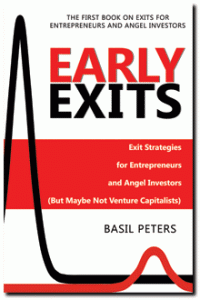 If you’re an entrepreneur, working at a startup, or thinking about starting a company, you should read Early Exits: Exit Strategies for Entrepreneurs and Angel Investors by Basil Peters. Basil is leading the charge on demonstrating the values and benefits of early exits. He’s definitely showing people — with concrete examples — that early exits are OK. In fact, more than OK!
If you’re an entrepreneur, working at a startup, or thinking about starting a company, you should read Early Exits: Exit Strategies for Entrepreneurs and Angel Investors by Basil Peters. Basil is leading the charge on demonstrating the values and benefits of early exits. He’s definitely showing people — with concrete examples — that early exits are OK. In fact, more than OK!
Basil provides a compelling argument — specifically around financials and time — for early exits. Research shows that the more money that goes into a company (and generally that means venture capital) the longer it takes for an exit to occur. Research also shows that companies with venture capital are more likely to fail (although those that succeed tend to succeed much, much bigger — which is where we see the big wins).
The book is very quick to read. I spent a couple hours going through it and enjoyed it immensely. Basil covers some of the basic but important elements of investment, including angel investment and venture capital. Another book that’s good for that is Mastering the VC Game by Jeff Bussgang.
The most important point of Early Exits is that it walks through the steps of succeeding with an early exit. Some of those steps are common sense, others are less obvious. Having recently sold Standout Jobs, I definitely had a few “Aha!” moments. Make no mistake — an early exit isn’t easy! That’s certainly not what Basil is preaching. But the benefits are clear.
Here are three big lessons learned from Early Exits:
- Early exits must be orchestrated from the very beginning. This is one of the key lessons from the book. If you’re not orchestrating and planning for an early exit, it doesn’t just pop out of nowhere and happen. Startups have to work at building towards an early exit from day one. Basil recommends having a list of 100 or so potential acquirers for a business before you even start! And he points out that he won’t invest in a startup unless the path to exit and the list of acquirers is clear and substantial. Startups need to have an early exit mindset from the get go.
- Alignment is therefore essential. Clearly everyone has to be on the same page within a startup for it to succeed with an early exit. Alignment is absolutely critical between the founders, employees and investors. A surprising number of entrepreneurs (some that are featured in the book) have stories about trying to exit early (because it would be a big financial win for them) only to have the sale blocked by investors because they wanted to see a higher return.
- A well-run process for selling your startup will significantly increase the sale price. There are numerous examples in the book that demonstrate how startups got a 50% boost in sale price by having a well-run exit strategy and process. That kind of kicker can have a huge impact on what founders and investors walk away with! The book goes through the keys to running a good sale process, and the gotchas that people run into.
Early exits aren’t bad. They’re not appropriate in all circumstances, but they’re not bad. In many cases they can be very, very, very good. If you’re just founding a startup or you’re in the middle of one, go read Early Exits.
 Founding Partner at
Founding Partner at 